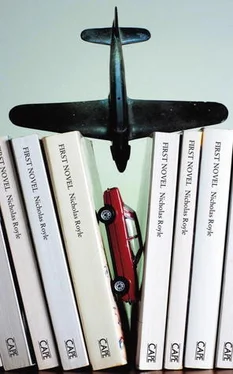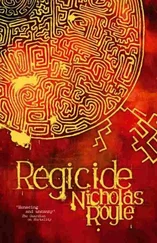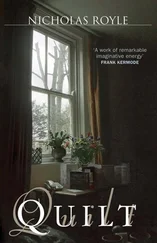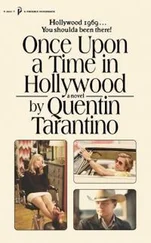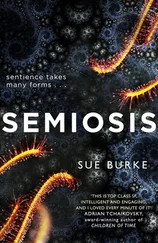The students begin turning up around 6 p.m. Grace is one of the first to arrive. Nikki brings a tray of tea, coffee and cake into the main room, a low-ceilinged, white-walled snug with an open fireplace and mismatched chairs and sofas. Grace perches on the edge of a low armchair in one corner where she can look through the poetry magazines and other journals stored on shelves in the alcove next to the chimney breast. The silence is broken only by the sound of Nikki pouring tea. She hands a cup to Grace, who mutters thanks, and then we all hear the sound of more arrivals and Nikki bustles off to welcome them, leaving me and Grace alone.
‘So,’ Grace says after a moment.
‘So,’ I say. ‘So.’
In the field below the house, the pheasant gives its industrial croak.
Within an hour, all the students are gathered in the snug. Every square inch of space on the sofas and armchairs is taken. Lawrence Duncan — or Duncan Lawrence — sits cross-legged on the floor. Helen sits at the end of the green sofa with her legs drawn up on to the cushion and her shoes removed. I know one or two of the other students — there’s Kieran, who’s writing an experimental novel about a bear that shaves off its fur and joins human society; Greg, an American student who has already published a collection of stories in the US and is now writing a novel; Geeta, whom I have advised to abandon her historical novel of Ancient Greece and concentrate instead on a voodoo mystery set in her native Trinidad — but several students I’m meeting for the first time because they are taught or supervised by my colleagues.
Nikki runs though her housekeeping announcements, then I remind the students how the week will be structured. I tell them I’ve made a grid on the flip chart in the dining room, dividing the afternoon sessions into half-hour slots, and I ask them to sign up for a one-to-one tutorial.
Grace asks if people can have more than one tutorial and I say that if everyone signs up, it’s unlikely there will be enough time. She wears a look of slight disgruntlement and I add that I hope everyone will get all the face-to-face time they think they need.
The evening proceeds with drinks, dinner and more drinks. Before anyone gets too drunk I make my excuses and retire to my room, where I keep the light off and sit by the window watching the smokers who have gathered outside in the garden. Grace, who doesn’t appear to be smoking and never seems to smell of cigarettes, sits with the smokers yet slightly apart from them. Her broad shoulders seem tense, hunched. It strikes me I have never seen her looking relaxed.
I pull the curtain and switch the light on. I am reading Siri Hustvedt’s The Blindfold . Thirty pages in, I have a strange sense of déjà vu as if I have read it before and know what’s coming next, and yet I’m certain I have never read it and in fact I have no idea what’s going to happen. When I start the second part of the novel it takes me a while to accept that it does not follow on from the first part, yet it seems inevitable that the different parts are obscurely connected.
In the morning, I am sitting outside looking across at the sandstone bluff on the other side of the valley when Lawrence Duncan — or Duncan Lawrence — comes and sits next to me.
‘Dude,’ he says.
‘Hiya.’
‘How’s it going, man?’
‘OK.’
‘Coolio. Nice view.’
‘Yes.’
‘You reading to us tonight, then?’ he asks.
‘That’s the plan.’
A small bird with a red face and yellow and black bars on its wings alights on the railing in front of us.
‘Do you know what that is?’ I ask him.
‘It’s a bird, innit?’
I smile. ‘It’s a goldfinch.’
‘Cool.’
‘Not necessarily,’ I say. ‘They used to represent death.’
‘Wicked.’
‘Mind you,’ I say, ‘most birds have represented death at one time or another.’
‘What about tomorrow night?’ he asks.
‘What about it?’
‘Who’s reading then? Who’s, like, the guest reader?’
‘Oh right. Lewis Harris. Writes crime novels. Independent publisher. That kind of thing.’
‘Cool.’
After breakfast we all sit around the large table in the dining room and I get the students to do a couple of ice-breaker exercises. First some automatic writing and then I ask them to pair off and interview each other about their novels-in-progress and to be prepared to feed back whatever they’ve learnt to the whole group once we have reassembled.
‘Pretend you are Kirsty Wark,’ I say. ‘It can be helpful for the interviewee to describe their own novel. Very often you find out stuff about your work you hadn’t been aware of.’
When they come back I get people to make a little presentation to the group based on what they’ve discovered about their partner’s novel. Greg partnered off with Grace and he comes back and announces that her novel is about a girl who kills a tramp and that it can be pitched as L’Etranger meets The Bell Jar . I glance at Grace and see that she is staring right at me.
‘Is that all you found out about it, Greg?’ I say. ‘It doesn’t sound a lot like the novel I’ve been supervising.’
One or two people laugh.
‘Well,’ Greg says, ‘it kicks off in Zanzibar in the 1960s. Or should that be on Zanzibar? Like Stand on Zanzibar ? Whatever. It kind of tells the story of this kid, how she comes into the world and what happens to her in it and how she ends up trying to leave it.’
‘What does that mean, Greg?’ I ask him.
‘Suicide attempts,’ he says. ‘Hence The Bell Jar .’
‘Sounds pretty intense,’ interjects one of the other students.
A few more people comment and we move on.
After the session, while people are getting lunch, I look at the flip chart and see that Grace has signed up for one of the afternoon tutorials. I get The Blindfold from my room and sit in the garden and read.
Grace comes to find me at 3.30 p.m. We stay outside.
‘I like all this stuff about Ray’s career,’ I say, ‘the way it develops. And I like the way you tell that story at the same time as telling the story of his relationship with his son, Nicholas. You interweave the two successfully. We’re never in any doubt as to which is the more important, yet keeping the story of his career just as prominent helps to ground the bigger story, make it more believable.’
‘Thanks.’
We’re sitting on the step outside the barn. The garden is wide but shallow and it’s just a few feet from where we’re sitting to the railing and then there’s the drop to the field with the pheasant and the sheep. I spend most of the half-hour tutorial staring across the valley at the woods and the sandstone bluff on the other side while talking to Grace or listening to her, very aware of her virtually uninterrupted stare drilling into the side of my head.
‘Is it still a bit clichéd?’ she asks.
‘Not the set-up or the plot, no, but every now and then you let a line get through that’s not really worthy of the rest of it. Like, er…’ I flick through the manuscript pages in my lap. ‘Or just a phrase, like this, “brushing shoulders”, when you’re talking about the other writers Ray encounters at book launches and so on.’
‘Is “brushing shoulders” a cliché, then?’
I pull a face. ‘I don’t know. Is it? It struck me as one when I read it. Mind you, I’m not even sure if it’s right, now I come to think about it. Is it brushing shoulders or rubbing shoulders? I’m not sure.’
‘Well, whichever one is the cliché, I can use the other one, right?’
I laugh. ‘I suppose so,’ I say. I’m looking at the manuscript again. ‘This, here. “This gentleman was just leaving.” It’s TV dialogue. Casualty. Holby City . You know, like “I’ll see myself out.” Phrases you never hear in real life, only on the telly. And not very good telly.’
Читать дальше
